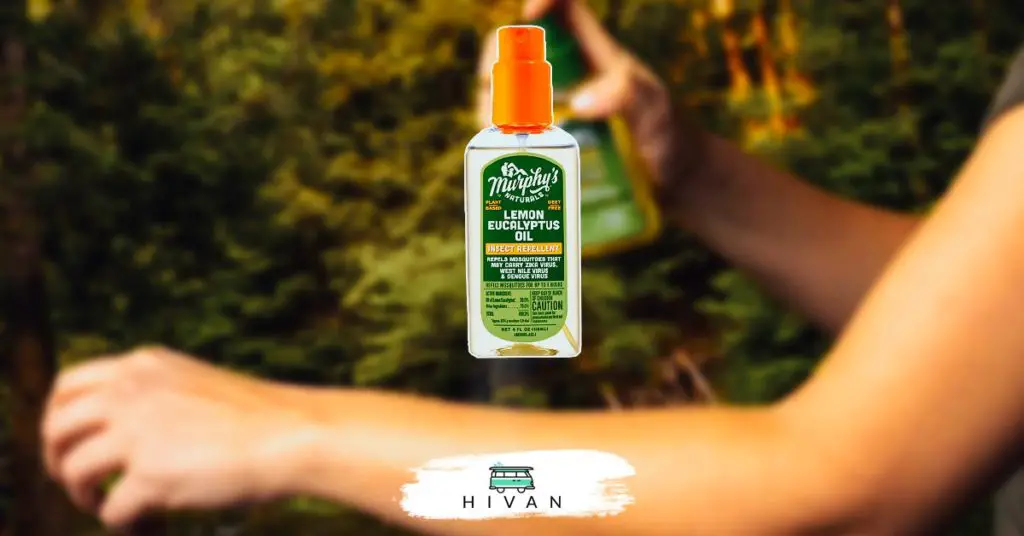Hi-van is supported by its audience. When you purchase using our links, we may earn an affiliate commission (no added cost to you). Learn more
Bug spray is known to repel bugs, but it doesn’t treat bites. If you don’t want to have to deal with several days of itchy, burny stings and bites, it’s best to use enough to prevent them from showing up. However, too much bug spray can cause skin irritation. How are you supposed to know how much to use?

You should use enough bug spray to cover your whole body without holding the bottle in one place for too long. Hold the bottle eight inches from your skin and constantly move the bottle while spraying to cover every area. Don’t hold it in one place because it’ll cause the spray to leave a residue.
Throughout this post, we’ll show you how much bug spray you should use, how long a bottle typically lasts, how long it stays on your skin, and whether or not you should put it on your clothes. We’ll also talk about sleeping with bug spray on your skin. Enjoy!
How Much Bug Spray Do You Need to Put On?
You need to put on enough bug spray to keep yourself covered wherever your skin is exposed. Many sprays deter insects because they mask your scent, which is why companies often instruct you to place them on areas prone to sweating. A thin layer of bug spray from a constantly moving bottle is more than enough.
Consumer Reports lists moving the bottle as one of its seven must-know rules of using bug spray. If you leave the bottle hovering over one spot of your skin or clothes, you’ll end up with a sticky, uncomfortable mess. Some sprays are strong enough to cause itchiness or red marks, so make sure you check the formula.
The good news is that most companies will provide instructions on how much you’re supposed to use. Too much bug spray won’t do anything to prevent bug bites and stings, so make sure you check the label. Nevertheless, a good rule of thumb is to apply bug spray just as you would apply sunscreen spray.
How Long Does a Bottle of Bug Spray Last?
A bottle of bug spray lasts up to three years before it’s time to get a new one. The formula can withstand the test of time, but separation can cause the liquid to become less effective. You’ll end up with bug spray that doesn’t do the trick, despite the fact that it smells just as powerful and pungent as a brand-new bottle of bug spray.
Here’s how you can make bug spray last longer:
- Insider claims the average bug spray mixture only lasts a few years, but you can make it last longer by keeping it out of direct sunlight. The sun’s rays can damage the bottle and weaken the formula. Keep it in a cool, dry place to get the most out of the spray if possible.
- Always shake the bottle before using it. This might sound silly, but a lot of bug sprays settle, so they need to be mixed thoroughly before they’re applied to the skin. A little bit of shaking can go a long way to help bring more effectiveness to an old or expired bottle of bug spray.
Do You Spray Bug Spray On Your Clothes?
You should spray bug spray on your clothes if it’s directed by the brand. Some companies sell bug spray specifically for clothing, keeping it off of your skin. However, other brands can leave stains and discoloration on your clothes. Check the bottle to know how you should use it for the best results.
So, how do you know if you can use bug spray on your clothes?
- Natural ingredients are almost always safe to use on clothes, so look for essential oils and mineral water. These additives won’t cause any harm to your skin or clothes (unless you have allergies), which is why they’re becoming more popular. Furthermore, they can be combined with DEET (a highly effective bug repellent).
- Check the label. Look for signs that say ‘safe for clothes’ or ‘not intended for use on clothes.’ If there’s nothing indicating whether or not it’s safe for fabric, Google the ingredients to know what they’re made of and how they can affect your clothes.
A Natural Repellent That Actually Works: Our insect repellent spray provides up to 6 hours of mosquito protection and provides up to 4 hours of protection against ticks.
If you’re looking for a bug spray that’s safe to use on your skin and clothes, try Murphy’s Natural Bug Spray. It’s made with eucalyptus oil, which naturally repels all sorts of insects. It keeps you safe from insects for up to six hours, which is significantly longer than most of its competitors.
Is It OK to Sleep With Bug Spray On?
It’s OK to sleep with bug spray on for a couple of nights in a row, but using it too often can cause skin irritation, rashes, and potential health issues. Most bug sprays have a lot of chemicals that eventually absorb into the skin, so you don’t want to spray them on yourself and sleep while they soak into your body.
Verlo mentions that using bug spray for prolonged periods can cause all sorts of discomfort since it contains pesticides. For short-term purposes, you won’t notice or experience health difficulties (again, unless you’re allergic to the formula). However, the pesticides can cause liver damage if you sleep with it on every night of the week.
Another problem is that bug spray can leave your clothes in a sticky mess. You’ll have to wash them frequently, which isn’t worth it. Excessive amounts of bug spray can ruin your clothes because sleeping naturally makes people sweat. Sweat combined with pesticides is a surefire combination to ruin most fabrics.
Conclusion
Using bug spray can make a huge difference in how much you enjoy exploring the outdoors, camping, or relaxing in your backyard. Warm summer weather can bring a lot of stinging, biting insects that nobody wants to deal with. Make sure you keep the bottle moving and use a formula with essential oils or DEET to get the job done.
Find this content useful 🙂 ?
Subscribe to our Newsletter and get a free Solar Electric Diagram + shopping list.


